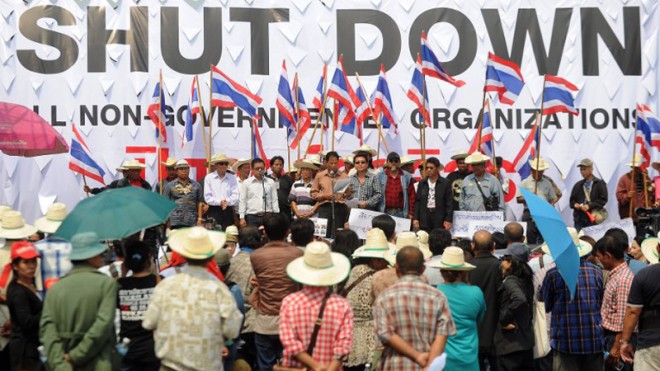Embattled Thai PM fighting for political survival

Supporters “Red Shirts” of Thai Prime Minister Yingluck Shinawatra attend a gathering after shutting down the gates of the headquarters of the National Anti-Corruption Commission in Bangkok on Thursday, Feb. 27, 2014. Thailand’s premier skipped an anti-corruption panel hearing on Feb. 27 into negligence charges that could lead to her ousting, as her government turned to the UN for help resolving a deadly political crisis. AFP PHOTO/MANJUNATH KIRAN
BANGKOK—Thailand’s premier skipped an anti-corruption panel hearing Thursday into negligence charges that could lead to her ousting, as her government turned to the UN for help resolving a deadly political crisis.
Prime Minister Yingluck Shinawatra is fighting for her political survival as pressure mounts on several fronts—in mass protests on the streets, in the courts and from the National Anti-Corruption Commission (NACC).
The backdrop is a longstanding struggle between a royalist establishment—backed by the judiciary and the military—and Yingluck’s billionaire family which has strong support in the northern half of Thailand.
The prime minister’s critics welcome the graft probe as a long-overdue attempt to hold the government to account, but to her supporters it is part of an attempted power grab.
Yingluck, who has protested her innocence, sent her legal team to acknowledge the allegations linked to a flagship rice farm subsidy scheme, as she toured her political stronghold in northern Thailand.
The NACC, which filed charges against Yingluck earlier this month, says she ignored warnings that the rice scheme was fostering corruption and causing financial losses.
Faces potential imprisonment
She now has 15 days to submit her defense. If found guilty by the NACC, she faces an impeachment vote in the upper house and a possible five-year ban from politics, as well as potential imprisonment by the courts on criminal charges.
It is unclear how long the commission will take to reach a conclusion.
“It is important that we hear all the facts from both sides,” said NACC official Vichai Vivatsaevee. “We do not have a ruling in mind.”
The legal moves comes amid a spike in political violence, often targeting protesters, that has left 22 people dead and hundreds wounded in recent weeks.
One of Yingluck’s deputy prime ministers said Thursday he would appeal to United Nations Secretary General Ban Ki-moon to try to broker an end to the crisis.
“There is no neutral person in Thailand, no one credible” to act as a mediator, Surapong Tovichakchaikul told reporters, a day after Ban condemned the violence and called for dialogue.
Protest leader Suthep Thaugsuban said on Thursday he was ready to meet Yingluck, but only if she “comes alone” and the talks are broadcast live on national television.
Yingluck indicated she would be ready to talk if protesters agree to end their rallies.
Justice or judicial coup?
The premier’s opponents accuse the Shinawatra family of plundering the public coffers to win the votes of rural voters through populist policies such as the rice scheme.
But government supporters and some experts see the charges as part of an attempted “judicial coup” by Thaksin’s foes within the royalist establishment, without sending tanks onto the streets.
“These are elaborate plans to overthrow the government without actually staging a physical coup,” said Verapat Pariyawong, a Harvard-educated lawyer and political commentator.
Dozens of pro-Yingluck lawmakers in the Senate, the upper house, face possible political bans over a failed attempt to amend the constitution to make the Senate fully elected.
Without a ruling party after protesters disrupted a February 2 general election, a power vacuum could emerge, leaving the remaining unelected senators to appoint a new prime minister, according to legal experts.
The political crisis comes at a time of anxiety about the health of 86-year-old King Bhumibol Adulyadej.
Some observers say that behind the street protests, a struggle is unfolding over who will run the country when the revered but ailing monarch’s more than six-decade reign eventually ends.
Dozens of pro-government “Red Shirt” supporters gathered outside the NACC offices on the northern outskirts of Bangkok Thursday, a day after they padlocked its gates—copying the tactics of opposition protesters who have blocked major state buildings.
The anti-government protesters want Yingluck to step aside in favor of an unelected “people’s council” to tackle what they see as a culture of money-driven politics.
They accuse Yingluck’s elder brother Thaksin Shinawatra—a billionaire tycoon-turned-premier who was ousted from office by royalist generals in 2006—of running the government from overseas, where he lives to avoid a jail term for corruption.—Thanaporn Promyamyai
RELATED STORIES
Prime Minister Yingluck Shinawatra summoned by anti-graft panel
Divided Thailand faces warnings of civil war
Thai army chief cautions nation may ‘collapse’ as violence escalates














